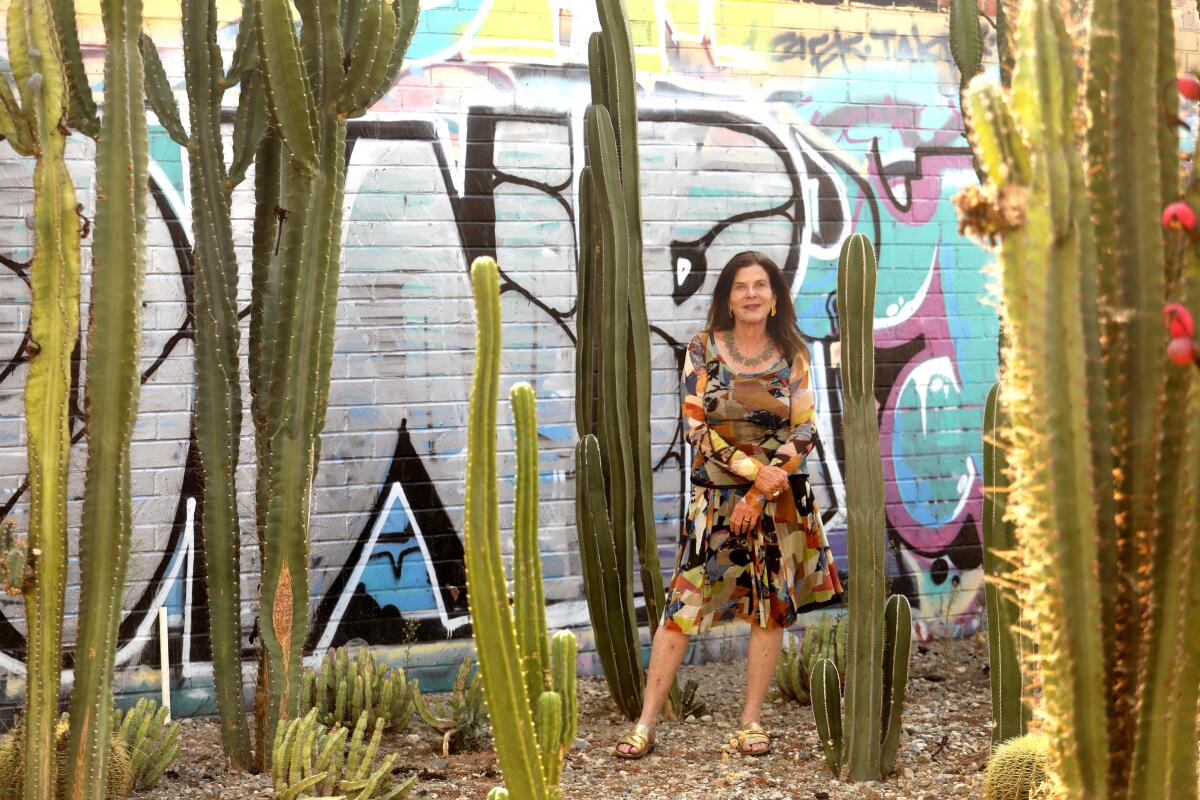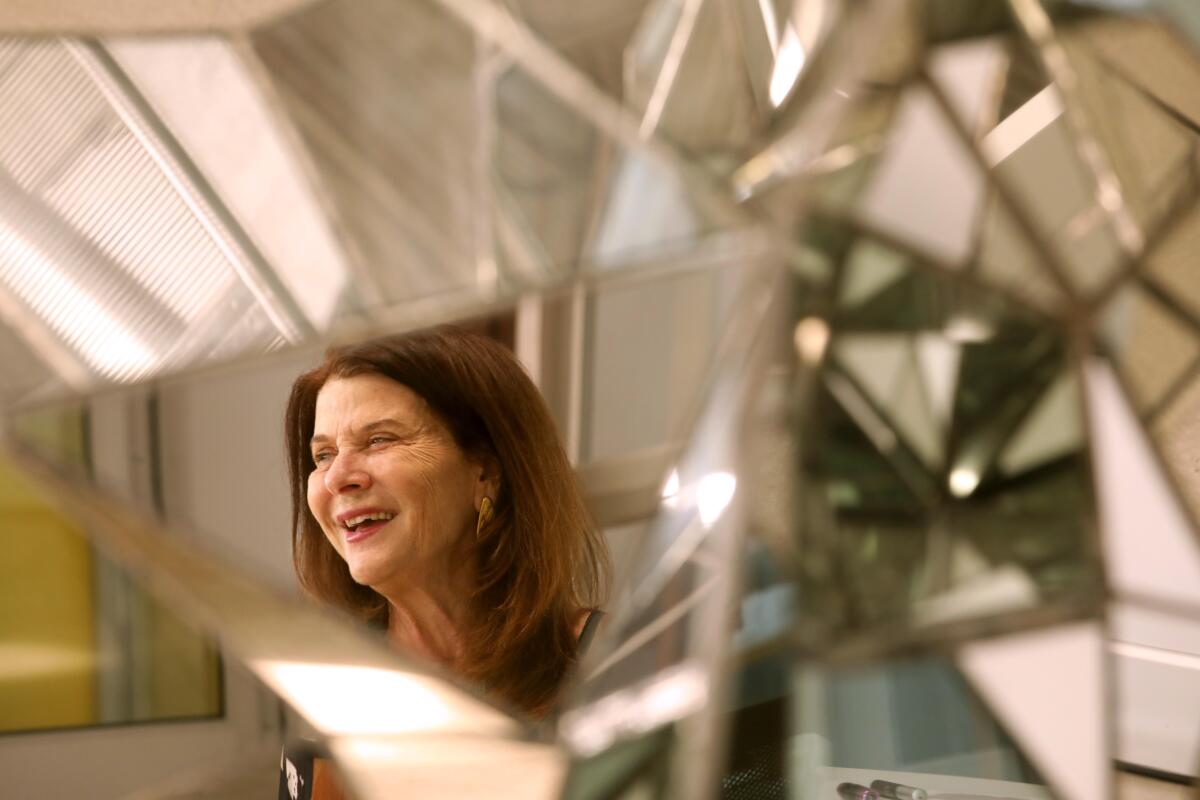How landscape guru Mia Lehrer will fight fire with design for mountaintop think tank

The policy think tank Berggruen Institute, whose plans for a campus in the Santa Monica Mountains were announced in 2016 by its billionaire founder, Nicolas Berggruen, is set to announce the addition of landscape firm Studio-MLA to the design team on Tuesday morning.
Founded by designer Mia Lehrer, the L.A.-based Studio-MLA has worked on master plans for the Los Angeles River and the Silver Lake Reservoir and has completed landscape designs for the Natural History Museum Los Angeles as well as SoFi Stadium in Inglewood. Last week, Lehrer was named to the Los Angeles Department of Water and Power’s Board of Commissioners (pending confirmation), a body that helps guide governance of the utility.
For the record:
2:13 p.m. May 6, 2021This article states that the Berggruen Institute pledged to leave 95% of its Santa Monica Mountains property undeveloped. The story should have noted that the pledge is in compliance with a preexisting legal easement on the property requiring that the open space be maintained.
Her firm joins Swiss architects Herzog & de Meuron, working in concert with the Gensler firm’s L.A. office, on the design and conception of Berggruen’s 450-acre site, which lies north of the Getty Center and Mount St. Mary’s University, west of the 405 Freeway.
The new SoFi Stadium will be home to the Rams and Chargers, but it holds the potential to be so much more to the communities around it.
Lehrer, whose studio has worked on previous projects in the Santa Monica Mountains, says the plan will provide important public access to the mountains — “the ability to get to the mountains, to see the view, to get a sense of the expansiveness.” The site will also provide an “opportunity to study what is the human connection to our ecology and how do we preserve that connection and how do we celebrate it.”
As part of the plan, the Berggruen Institute has pledged to leave 95% of the property undeveloped and make it accessible to the public via a network of trails.
While the land is wild, it is not pristine wilderness. Previously, the area had been zoned for construction of 28 estate homes (real estate parlance for what are generally known as McMansions). Before that, the site was employed as landfill, with some of its ridges graded during the 1980s.
Initial architectural plans for the institute were released in 2017, showing a slender, one-story concrete structure elevated above the ridge on columns. At the time, architects Herzog & de Meuron said they intended to keep the footprint generally light.
“We want to make a contribution to a sustainable way of building,” said Jacques Herzog, one of the firm’s founders, in 2017, “not just another golf course or luxury five-star hotel.”
Last year, the Getty fire, sparked by a tree branch that fell on power lines in the Sepulveda Pass, consumed 745 acres and a dozen homes near the site of Berggruen’s complex. Lehrer says that the landscaping of these kinds of fragile ecosystems, at a time of explosive wildfires, is something she has been studying and working on for years.
“How do we deal with fire? How do we deal with resilience?” she says. “There is a lot of interesting new research.”
“I did a conference about three months ago about the importance of soil and how healthy soil can help slow down a fire,” she adds. “If it’s dry, then the fire goes into the cracks — fire moves differently on different soil. So the idea of what we have to do is make our soil healthier in our mountains.”

Her firm’s landscape for a children’s camp in Santa Clarita, in the vicinity of Magic Mountain, dealt with these issues. There, Studio-MLA used resilient vegetation with spacing between plantings and structures.
In 2013, the Powerhouse fire tore through the area. “There was smoke damage,” says Lehrer. “But nothing burned.”
These are some of the issues she will be tackling as her team prepares to conceive a design for the Berggruen property. “We’ll probably work with university professors and nonprofits to experiment,” she says.
Is Los Angeles still the sort of city that pursues hugely ambitious cultural and architectural projects?
In a statement, Berggruen says, “Mia’s deep knowledge of the Southern California environment and her ability to translate those qualities of place through community through design will help us create something extraordinary for Los Angeles.”
“Together, we will help to preserve and protects hundreds of acres of opens pace while providing increased access to nature for all.”
More to Read
The biggest entertainment stories
Get our big stories about Hollywood, film, television, music, arts, culture and more right in your inbox as soon as they publish.
You may occasionally receive promotional content from the Los Angeles Times.











